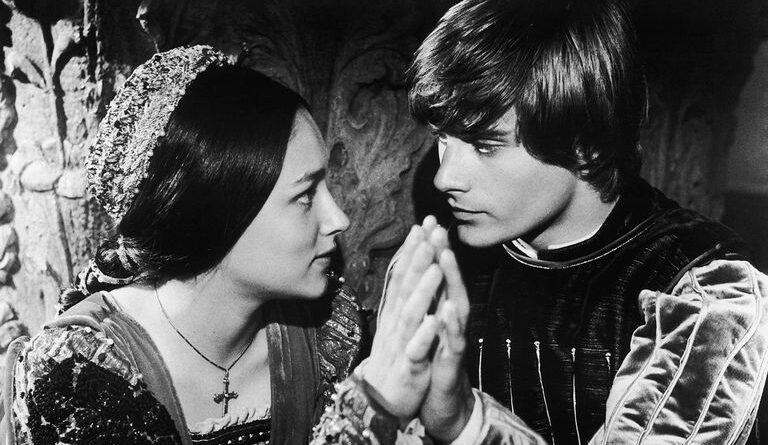Ideas of Love: Romeo and Juliet as a Tragedy
Shakespeare’s play Romeo and Juliet is considered a tragedy and carries the universal themes of doomed romantic fatalism, destructiveness of feuds and youth. The play was written either in 1594 or 1595 and was adapted from an Italian tale The Tragical History of Romeos and Juliet. The play lays an emphasis on romantic love illustrated by the intense love experienced by Romeo and Juliet during their first encounter at the feast. Their love is portrayed as a ecstatic, violent and overwhelming force that defies over values like authority, family and friendship (Hodgdon, 2005). This excessive passion is so powerful that it subjugates the guiding forces of reason and common sense. Despite their excessive love enabling them achieve a certain level of maturity beyond their young ages; it also makes them take dangerous risks that bring their lives to a tragic conclusion.
The behaviors of the teen lovers and events they had limited control over like the feud between their families gave them limited opportunity to last long enough to attain full growth. In the end, their excessive passion resulting from overwhelming and empowering feelings causes them to take their one live leading to a tragic end. Also, the passion to kill in defense of their love serves as a cause of violence and tension between the feuding families leading to death of their own children including Mercuto, Tybalt, Romeo and Juliet. Excessive passion in Shakespeare’s Romeo and Juliet leads to tragedy. This paper will explain the significance of excessive passion in fostering an understanding of the play Romeo and Juliet as a tragedy.
Discussion
Excessive passion is essential in helping in the understanding of Romeo and Juliet as tragedy because love and hate are the most dominant themes in the play. They permeate the play and are connected by passion which is either destructive or beneficial. The grand passion in Romeo and Juliet is love and just as it is blinding, so is it capable of overwhelming and powerful as hate can be. Excessive hate evident at the beginning scenes between the servants of the feuding families illustrates the power of hate which has grown from the family members to its servants. The passion to hate leads to tragedy when Mercuto and Tybalt are killed.
Also, excessive passion of love is evident when Romeo instantly falls in love with Juliet the moment she notices her for the first time at the feast. The intense love that springs up between the two teenagers is a violent, empowering, ecstatic force that tends to supersede all other loyalties, values and emotions. For instance, it is because of the excessive passion for love that makes the young lovers to defy the rest of the world including their families, friends and the authority of the land. This is evident when Juliet asks “Deny thy father and refuse thy name,”, “Or if thou wilt not, be but sworn my love, / and I’ll no longer be a Capulet” (Shakespeare, 1992). Romeo is forced to abandon his friend Benvolio and Mercuto to go and see Juliet in her garden.
Also, Romeo defies the prince’s order to exile him from Verona and goes back to see Juliet. Such excessive passion for love is seen as source of tragedies that befalls the two lovers. Excessive love each other becomes a powerful and brutal emotion that catapults Rome and Juliet against the world as well as against themselves. The intensity of the love existing between the young lovers can not be described in entirety. For instance, the love experienced between Romeo and Juliet during their first meeting is described in religious context as a sort of magic. In addition, Juliet is unable to describe the kind of love she had for Romeo. Their excessive passions makes them unable to make any moral judgment existing between love and religion, society and family, and this illustrates the chaotic nature of a passionate love which causes violence, death and impressionistic rush that leads to a tragic end for them.
Moreover, tragedy in Romeo and Juliet resulting from excessive passion is evident when the Capulet’s makes a decision that Juliet was to marry Paris. Following the marriage decision, Juliet swore to die when she says “If all else fail, myself have power to die” (Shakespeare, 1992). Also, both lovers fantasize about death each other a night after their first and only sex experience. Their excessive passion to experience death continues in the play till their inevitable tragedy of double suicide at the end of the play. The tragic end of Romeo and Juliet is as attributed to their excessive love for each other compelling them to make the ultimate choice of death as the highest potent of preserving their love. Death was the only way to ensure preservation of their love which was so profound to the extend they were willing to die in defense of it. Therefore, it is in understanding of the excessive passion of love between Romeo and Juliet that one can comprehend the tragedy in the play.
Tragedy in Romeo and Juliet can be better understood by considering themes of death and love which are evidently connected by passion. The excessive passion can either be hate or love. In Romeo and Juliet, passion for hate, love, death and violence are rather obvious. The passion of love experienced between Romeo and Juliet at first sight serves as their inception with death because, it is the time that Tybalt notices that Romeo had crashed the feast making him determined to kill him (Brode, 2001). Right from their first meeting, the love existing between Romeo and Juliet pushes them more towards love and violence. This is evident by their consistent suicidal thoughts portrayed in the play. Juliet pulls a knife to use to take her own life while Romeo brandishes a knife and threatens to kill himself f being banished from Verona and from seeing Juliet. This shows the lovers willingness to experience suicide, a tragedy resulting from excessive passion.
Conclusion
Shakespeare’s play Romeo and Juliet is considered a tragedy simply because of the protagonists Romeo and Juliet who are young ‘star-crossed’ lovers who are faced with momentous obstacles resulting to their fatal and horrible ending. The tragic end of Romeo and Juliet is partly attributed to their rush actions, incomplete or bad advice, parents hate and fate. The young lovers have intense passion for each other but lack enough opportunity to make their lives work. Studying the excessive passion for love and death plays significant role in the understanding of the play Romeo and Juliet as a tragedy. The feuding families have intense hate for each other while their children Romeo and Juliet have intense passion to love for each other. The excessive passion of love and hate leads to death of members of these feuding families prompting their reconciliation at the end of the play. Despite the admiration that the two young lovers get for their courage in facing adversity, their fatal end attracts pity and reconsideration of the consequences of entertaining excessive passion of love and hate.
References
Brode, D. (2001). Shakespeare in the movies: from the silent era to today. London: Berkley Boulevard.
Hodgdon, W. (2005). A companion to Shakespeare and performance. New York, NY: Blackwell Publishing.
Shakespeare, W. (1992). Romeo and Juliet. Washington, DC: Washington Square Press.




